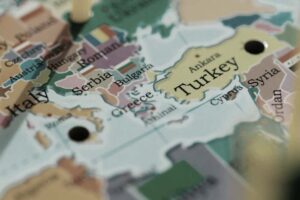
Israel will become a regional and possibly global superpower by 2100, the country’s leading future studies expert says. As international turmoil grows, a powerful Israel will be an island of stability in an insane world, David Passig says.
In 30 years, there will be 18 million Jews in the world, with 12 million of them living in Israel, Passig told Israel Hayom daily. Never before was such a large proportion of the global Jewish population concentrated in the Jewish state, he said.
But what is the secret of Israel’s power and stunning growth? And what will make some countries more powerful than others in the 21st Century?
The answer is complex, but three key factors will largely determine whether states rise or fall in what promises to be a turbulent era. Israel, it seems, is particularly well positioned to face the challenges ahead.
The three elements below only tell a part of the story, but each will play a critical role in the destiny of nations. This triple power combination links the traditional and the modern in creating a formula for national success. States that do well on all three fronts will thrive; others could quickly fall behind.
Israel avoids fertility crisis
For many decades, high fertility was a negative factor that hindered the development of nations. Moderate birthrates enabled some of the world’s strongest countries to invest their resources efficiently and achieve phenomenal growth. However, things have been changing.
Fertility rates in the Western world and elsewhere have dropped dramatically, falling well below the replacement rate of 2.1 births per woman. This will create some tremendous challenges, as some nations increasingly struggle to maintain their vitality and economic growth.
The numbers are staggering. Italy’s population is projected to fall from 60 million to 54 million by 2050, according to UN figures. Meanwhile, the population of Japan is expected to drop from 126 million to about 105 million.
The combination of declining birthrates and a rapidly aging population could be devastating. Moreover, some countries are trying to counter the problem by boosting immigration, which offers some benefits but increases social friction.
And where does Israel stand? The Jewish State currently boasts the highest fertility rate in the OECD with about 3 births per woman. This is almost one more child than the next countries on the list, says the Taub Center for Social Policy Studies.
This robust birthrate plays a crucial role in driving Israel’s economy and charges the nation with great energy. While other countries scramble to devise plans for dealing with the fertility crisis, Israel is immune to this challenge and the immense problems it could create.
On a deeper level, the consistent population growth is turning Israel from a small to a moderately populated country. Israel will reach the 15 million mark by 2050 according to projections. In the process, Israel is overtaking countries such as Serbia and Portugal. Soon, it will eclipse Sweden.
Currently, Israel is the only country projected to triple its population in the 21st Century. This dramatic increase is a sometimes overlooked key component of Israel’s growing power.
The age of technology
Modern technology plays a critical role in every aspect of our private and national lives. New developments are transforming the ways in which we interact with the world, while offering us unprecedented opportunities and capabilities.
However, what is unique to the 21st Century is the ferocious pace of new advancements. Even relatively new technologies and tools are quickly becoming obsolete, as more innovations replace them. In this rapidly changing world it is all too easy to stay behind.
On this front, too, Israel is exceptionally strong. Indeed, the start-up nation features boundless creativity, inventiveness and entrepreneurial energies. Israeli companies are constantly making exciting contributions to fields such as autonomous driving or medicine, among many others.
Israel also benefits from the huge resources poured into developing cutting-edge military gear. Among other things, technologies developed in the army often have rewarding civilian applications. Moreover, some of the country’s brightest minds gain unparalleled experience and skills in the IDF’s top technology units.
And so, while some countries are still struggling to adjust to the technological age, Israel keeps charging forward. Israeli satellites already circle the earth, and an Israeli spacecraft almost landed on the moon in 2019.
As we move deeper into the 21st Century, the world will increasingly be divided into technological haves and have-nots. The consequences of being technologically backward will be grave and could lead to a painful national decline. In this race, Israel will likely remain near the top of the pack.
Israel’s powerful military
Military strength is traditionally one of the hallmarks of powerful nations. However, in recent decades, the importance of military power in the Western world has declined significantly.
The vast destruction of the Second World War forced many nations to focus on reconstruction and left them with little appetite to fight again. The Cold War presented a menacing threat but never escalated into open conflict on European soil.
Once the Soviet Union collapsed, it appeared that there was little need to maintain large armies or invest billions in military hardware. But this perception is quickly changing.
In 2017, Israeli military historian Yagil Henkin published a series of articles on the rapid decline of European armies. His project detailed the drastic reduction of Europe’s military forces, and the trouble this spells as old and new threats emerge.
Growing challenges such as an aggressive Russia, or the increasingly belligerent attitude of Turkey, could pose grave danger right at Europe’s doorstep.
The rise of radical Islam is also threatening some of the world’s strongest and wealthiest countries. While this is sometimes a home-grown threat by now, its roots and base of operations are in the Middle East, where military muscle will continue to matter.

Israel, meanwhile, has built one of the world’s most powerful military machines. The IDF constantly improves its weapons and intelligence capabilities, while regularly deploying elite units and a highly effective Air Force. Israeli engineers are also upgrading US military gear like the advanced F-35 fighter jets.
Living in a tough neighborhood has its price, but it also ensures that the Jewish State is prepared to cope with an unstable world. Indeed, being militarily vulnerable in the 21st Century could carry disastrous consequences for otherwise strong nations.
Israeli power keeps growing
Notably, the picture is not entirely rosy, as Israel will also face some significant challenges in the coming decades. Security concerns will remain a prominent feature, while domestic tensions could worsen. Still, Israel boasts an exceptionally strong foundation for future success.
This forecast is reinforced by previous research done by Passig. Based on his analysis, Israel will become an even stronger economic and geopolitical player.
Passig, who already made some stunning predictions that came to pass, foresaw Israel’s ascendancy years ago. In a 2010 interview with business daily The Marker, he presented an optimistic outlook for the country’s future.
“When we investigate past and present models, we see that the State of Israel is becoming very strong in in the next 40 to 50 years, with a tendency toward important geopolitical moves and an economic boost,” Passig said. “Israel’s position in the region keeps getting stronger.”


